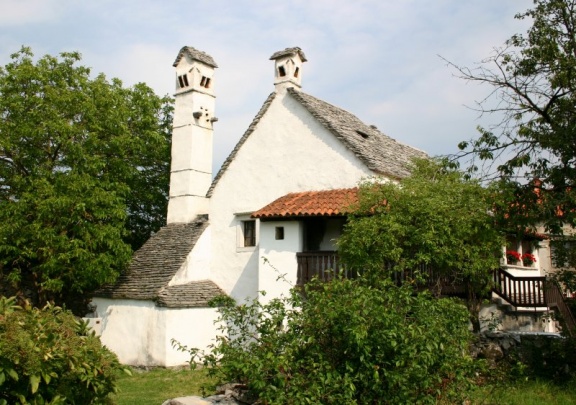Difference between revisions of "Škratelj Homestead"
(beautified by filter) |
|||
| Line 1: | Line 1: | ||
{{Infobox | {{Infobox | ||
| − | | | + | |name = Ita Rina in ?krateljnova hi?a, spomenik kra?ke arhitekture, Diva?a |
| − | | | + | |street = Kra?ka cesta 26 |
| − | | | + | |town = Sl-6215 Diva?a |
| − | | | + | |telephone = 386 (0) 5 731 0930 |
| − | | | + | |fax = 386 (0) 731 0940 |
| − | | | + | |email = obcina@divaca.si |
| − | | | + | |website = http://www.divacamuzej.si |
| − | | | + | |founder = Municipality of Diva?a |
| − | | | + | |contacts = {{Contact |
| − | {{Contact | + | |name = Zdenka Hre??ak |
| − | | | + | |role = Project Manager |
| − | | | + | |email = zdenka.hrescak@divaca.si |
| − | | | ||
}} | }} | ||
{{Contact | {{Contact | ||
| − | | | + | |name = Lilijana Nedi? |
| − | | | + | |role = Museum Collection Manager |
| − | | | + | |telephone = (01) 43 42 505, |
| − | | | + | |email = lilijana.nedic@kinoteka.si |
}} | }} | ||
| − | | | + | |opening hours = 9am-1pm Wed, 10am-12pm Sat, 10am-1pm Sun, closed Mon-Tue and Thu-Fri |
}} | }} | ||
| − | |||
{{Abstract| | {{Abstract| | ||
| − | + | ?kratelj House in Diva?a features a permanent exhibition on Slovene movie star Ida Kravanja (stage name Ita Rina), which was conceived by the [[Slovenian Cinematheque]] and opened in [[Established::2000]]. | |
There are plans for the permanent exhibition on the actress to be supplemented by a museum of the Slovene Film Actors that will also include also a small cinema hall for screenings and workshops. The renovation is supported by the donation of Norway through the Norwegian Financial Mechanism. | There are plans for the permanent exhibition on the actress to be supplemented by a museum of the Slovene Film Actors that will also include also a small cinema hall for screenings and workshops. The renovation is supported by the donation of Norway through the Norwegian Financial Mechanism. | ||
| Line 31: | Line 29: | ||
Ita Rina (1907-1979) was the first Slovene to achieve international star status - her heyday was in the late 1920s when she starred in the film ''Erotikon'' (1929) by Czech director Gustav Machaty, which enjoyed major box-office success both in Europe and in the USA. }} | Ita Rina (1907-1979) was the first Slovene to achieve international star status - her heyday was in the late 1920s when she starred in the film ''Erotikon'' (1929) by Czech director Gustav Machaty, which enjoyed major box-office success both in Europe and in the USA. }} | ||
| − | The young Slovene actress first lived in Berlin, at that time centre of European film industry, and her debut was in the role of a chambermaid in ''Was die Kinder ihren Eltern verschweigen''. After 00''Erotikon'' she performed in the first Czech sound film ''Gallows Toni'' in 1930. She declined an invitation from Hollywood and instead moved to Belgrade, got married and changed her name to Tamara | + | The young Slovene actress first lived in Berlin, at that time centre of European film industry, and her debut was in the role of a chambermaid in ''Was die Kinder ihren Eltern verschweigen''. After 00''Erotikon'' she performed in the first Czech sound film ''Gallows Toni'' in 1930. She declined an invitation from Hollywood and instead moved to Belgrade, got married and changed her name to Tamara Djordjevi?. Thereafter she starred in several more films, including the Yugoslav production War (1960), however she never managed to regain her earlier fame. After the war she also appeared in several Yugoslav theatre productions. Ita Rina died in Budva, and was buried in Belgrade. |
| − | == | + | ==?kratelj House== |
| − | The architecture of | + | The architecture of ?kratelj House and its courtyard (borja?), a monument of 17th-century Karst architecture, is well preserved. The exhibition on the first floor presents the life of Ita Rina and the development of Slovene film during her day. |
[[Category:Museums]] | [[Category:Museums]] | ||
Revision as of 06:03, 7 November 2009
The young Slovene actress first lived in Berlin, at that time centre of European film industry, and her debut was in the role of a chambermaid in Was die Kinder ihren Eltern verschweigen. After 00Erotikon she performed in the first Czech sound film Gallows Toni in 1930. She declined an invitation from Hollywood and instead moved to Belgrade, got married and changed her name to Tamara Djordjevi?. Thereafter she starred in several more films, including the Yugoslav production War (1960), however she never managed to regain her earlier fame. After the war she also appeared in several Yugoslav theatre productions. Ita Rina died in Budva, and was buried in Belgrade.
?kratelj House
The architecture of ?kratelj House and its courtyard (borja?), a monument of 17th-century Karst architecture, is well preserved. The exhibition on the first floor presents the life of Ita Rina and the development of Slovene film during her day.



